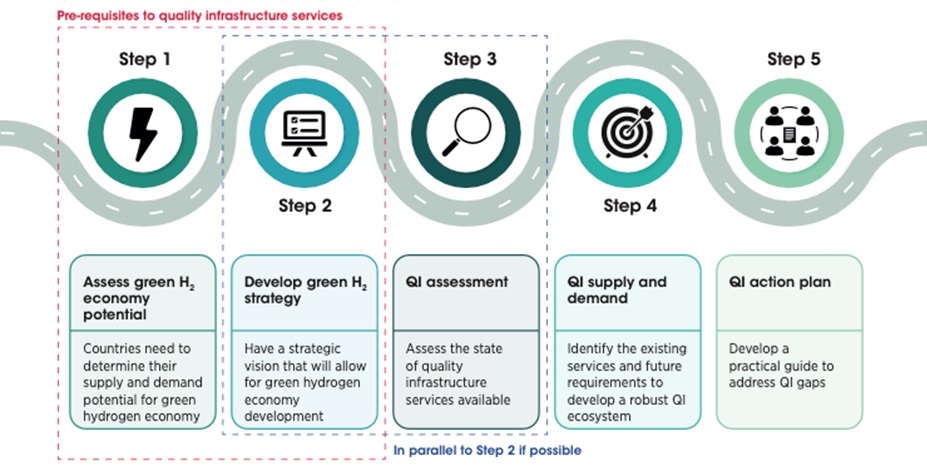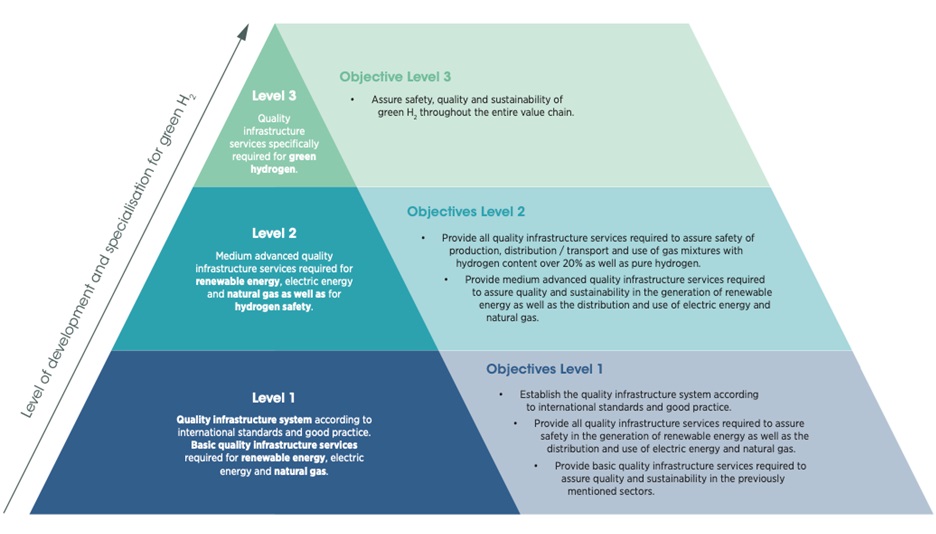A Quality infrastructure roadmap
Due to the global climate crisis, there is an urgency for all sectors of the global economy to be decarbonised – following a net-zero compatible pathway – by or around 2050. While most industries and applications can rely on electrification with renewable power, some hard-to-abate sectors need more than electrification alone, and require the use of hydrogen, or hydrogen derived commodities like ammonia, methanol or direct reduced iron (DRI) steel to achieve net-zero emissions. According to IRENA’s 1.5°C scenario, green and blue hydrogen production would need to increase to 125 million tonnes per year (Mtpa) by 2030 and 523 Mtpa by 2050. This brings both opportunities for development, as well as challenges for scaling and adapting the production, infrastructure and end-use value chains required. The existence and further development of a robust Quality Infrastructure – defined as a system comprised of organisations, policies, legal framework, and practices required to assure quality, safety and sustainability of products and services – for green hydrogen is a key pillar for enabling this transition.
Ferdinand Consultants supported IRENA, the International Renewable Energy Agency, throughout its project focused at practical recommendations on the development of quality infrastructure services for the green hydrogen value chain. Niels Ferdinand is one of the key authors of the related publications. The project was implemented together with Physikalisch-Technische Bundesanstalt (Germany’s national metrology institute – PTB) and with financial support from Germany’s Federal Ministry of Economic Cooperation and Development (BMZ).
Quality infrastructure provides instruments and services to reduce safety, financial, and reputational risks in the sector while supporting the achievement of the intended positive sustainability impacts of investments. IRENA’s report “A Quality Infrastructure Roadmap for green Hydrogen” includes an overview of the main considerations and good practices for the key elements that underpin the quality infrastructure ecosystem, namely standardisation, metrology, conformity assessment (testing, certification, inspection, verification, and validation), and accreditation, as well as technical regulations relevant for the hydrogen sector.
A key output of the project is a general roadmap on how countries can develop their quality infrastructure to effectively support the green hydrogen sector, with particular focus on the hydrogen production and distribution segments of the value chain. The five steps included in this roadmap approach are:

IRENA piloted the roadmap in a case study developed for Tunisia together with the Ministry of Industry, Mines, and Energy. Ferdinand Consultants supported the pilot application, identifying Quality Infrastructure services offered and required, proposing an action plan for Tunisia and participating in the related stakeholder consultation. See contents of the case study here.
A three-level model is proposed which defines the required quality infrastructure services at different levels of development of the green hydrogen sector:

A checklist of services for each quality infrastructure pillar is provided, that can be used by policymakers and industry stakeholders to ensure that key services are in place from basic services to specialised requirements for green hydrogen. A database, comprising of a non-exhaustive list of available and upcoming quality infrastructure standards was also created.
The project developed comprehensive knowledge and defined a systemic approach to develop quality infrastructure for the emerging green hydrogen. The roadmap provides a structured method and practical tools for decision-makers and practitioners to apply when considering the vital role of quality infrastructure in supporting their energy transition efforts.


